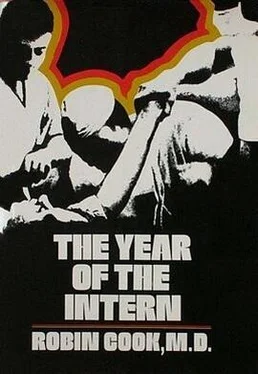That’s the ideal situation. In practice, you must often push this way and that on the throat with your free hand, looking for the trachea, and sometimes you never do find it. And even when you do, your troubles are still not over, because sliding the tube down can be devilishly hard. The precious hole between the vocal cords will be obscured at the last second by the rubber tube. Nothing to do but push it in blind. Too often your dead reckoning leads the tube into the esophagus, so that when you try to ventilate the patient — force air into him — his stomach blows up instead of his lungs. And all the while there is usually someone else pounding on the man’s chest, and the laryngoscope is clanking against his teeth or jumping out of his mouth, and the whole area may be filling rapidly with fluid of one sort or another. Putting down an endotracheal tube was, to me, a subject fit for nightmares.
But there was no one else around to do it, so I pulled the man’s bed out and got behind his head with the laryngoscope. “What’s his basic problem?” I asked hastily, pulling his head back.
“He doesn’t follow his pacemaker all the time,” one of the nurses said.
Suddenly it made more sense. “What’s he been on? What’s in that bottle?” I said, motioning to the IV bottle. “Isuprel,” came the answer, and I told them to speed it up. I knew that Isuprel helped the heart with its contraction and was especially useful in cases where the heart wouldn’t contract on its own.
“How fast?”
How fast? I hadn’t the slightest idea. “Let it run.” I couldn’t think of anything better to say. His head was back now, and the laryngoscope far down into his throat, but I couldn’t see the vocal cords. “Get me an amp. of bicarbonate.” As one of the nurses vanished from the periphery of my vision, I realized that at last I had thought of something on my own. Then the vocal cords appeared. Their white contours stood out against the surrounding red like the gates to a subterranean chamber. For once I managed to get the tube into the trachea without too much of a struggle.
But no sooner had I slipped the tube in than the patient reached up and pulled it out. I was indignant, just for a second, until I realized he was breathing again. A strong, full pulse showed in his wrist. The nurse appeared with the bicarbonate. Stupidly, I wanted to give that stuff now, because I had thought about it and the nurses hadn’t, and especially because I knew a lot about electrolytes and pH and ions. But I wondered what the effect would be on the calcium level. Both calcium and potassium combined with the pH in a tricky fashion. I was in danger of overthinking and getting all balled up, so I decided to save the bicarbonate; no sense rocking the boat.
Suddenly an anesthetist burst panting through the door, and another intern, followed by a resident, and another resident. All of them looked sleepy. One had no socks on, and there were pillow creases on the side of his head. The crowd continued to swell as another resident rushed in. This was about the time I liked to arrive, when everything was under control and decisions could be by committee. Actually, I was beginning to calm down, although my own pulse was still racing. The newly arrived house staff settled down on the counter and chairs. One of them leafed through the chart, while another called the private attending. I stayed beside the patient, who had started to talk. His name was Smith.
“Thank you, Doctor. I’m all right now, I think.”
“Yes, all your signs are good. We’re glad we could help you.” Our eyes locked, his showing more trust than I thought I deserved, and mine trying not to give away my inner uncertainty. The Isuprel was still running into him like crazy, and I didn’t know whether to slow it down or not. Let the others carry the ball for a while. Mr. Smith wanted to talk.
“This is the third time for me, I mean the third time my heart has decided not to follow my pacemaker. When it happens, I don’t have time to think, but afterward, like now, it all falls into a pattern. First, my throat tightens up, and then suddenly I can’t breathe, nothing at all, and then everything goes gray and shadowy.” I was listening hard, but only half comprehending. It was incredible to be talking with him when a few minutes ago he hadn’t been there.
“A shadow, that’s the best word I can think of, but the shadow doesn’t pass. It goes deeper into blackness, until no light is left in the world.” He stopped abruptly. “But do you know the worst part, Doctor?” I shook my head, not wanting to interrupt him. “The worst part is coming out of it, because it happens so slowly; not like going down, which is quick. First, I have these wild, chaotic dreams. No sense to them that I can find, until finally — it seems forever — the room and the bed and the people come into the dream and eventually take over. I can’t explain why, but the last thing to come back is an awareness of myself, who and where I am, and the hurt. My chest feels caved in, as if I’m smothering from lack of air, especially if there’s a tube in my throat.”
“That must be why you pulled the tube out. Have you had many operations?” I asked.
“Enough to fill a book. Appendix, gall bladder...”
I interrupted him. “Do you remember what it was like to be put under anesthesia? Have you ever had ether?” That was one experience I remembered vividly, although it was a long time ago, when I was four or five. Back then, everybody had his tonsils out, and I remembered my terror as the ether mask was put over my face, the room began to fade, and an unbearable buzzing sounded in my ears. Then concentric circles moving faster and faster until they collapsed into a bright red center; then nothing, until I awoke vomiting.
“My appendectomy was in 1944,” said Mr. Smith, thinking back, “while I was in the Navy, and I believe it was ether.”
“Was that anything like the feeling you get when your heart stops? What about waking up?”
“No, not at all. The anesthesia is somehow pleasant, nothing like struggling with my heart — it seems literally like a struggle to keep it from jumping out of my chest, keep it under control. I can’t remember waking up from those operations, but when my heart starts up again it is like a thousand unending nightmares.”
He reached up and touched my hand, which rested on the bed railing. “God, I hope it doesn’t happen again. You see, I can’t be sure anybody will be there to help. You know, Doctor, there’s another strange thing — this time I felt I was watching my own body from someplace outside of myself, as if I was standing at the foot of my own bed.”
“Have you had that feeling before?” I asked, curious now; feeling outside oneself is a symptom of schizophrenia.
“Never. It was a unique sensation.”
A unique sensation. A unique sensation. This man was telling me about dying, but the way he told it made death into a living process, something you could study in a textbook. Without that defibrillator, of course, he would have been dead, and with him all those thoughts. Tonight the line between life and death had hardly existed for three people — for him, for Marsha Potts, and for the old man with cancer. I was having trouble thinking about life and death at the same time, but I was happy this man wasn’t dead, because he was so nice. What a stupid thought. Anyway, I couldn’t imagine him dead. No matter what had happened he wouldn’t have died, because he was alive right at that moment.
Does that make sense? It did to me. Who was I to think that I could have changed fate? Being alive and talking and thinking is so different from being dead and immobile that the transition seemed impossible now. It had been so simple, just a zap with the defibrillator, like slapping someone on the back to stop a cough, or running for a glass of water. Maybe he hadn’t been fibrillating; maybe he would have come out of it on his own. He had before. I would never know.
Читать дальше












